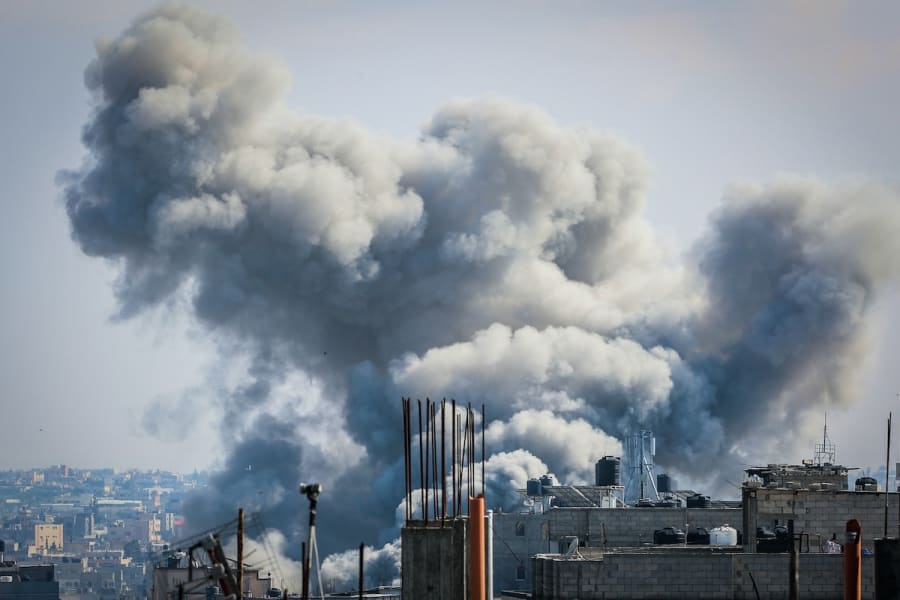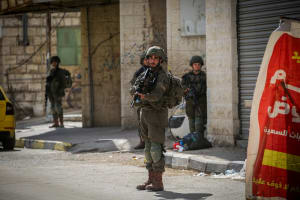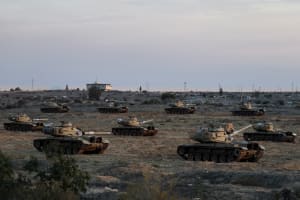In effort to ease tensions with Egypt, Israel will present plans for impending offensive Rafah operation

Israel intends to present Egypt with its expected military operation plans against Hamas forces in Rafah to reassure the neighboring country that it will not be negatively affected by the fighting.
On Saturday night, Israeli Prime Minister Benjamin Netanyahu confirmed that the operational plans for its impending ground operations in Rafah would include the evacuation of civilians.
Situated close to the Egyptian border in the southern Gaza Strip, Rafah is considered a key town to defeating the terrorist organization Hamas. Most of the remaining Hamas senior leaders and operatives in Gaza are concentrated in the Rafah area. In addition, most of the remaining Israeli hostages are believed to be held in captivity there.
Due to its strategic location adjacent to the Egyptian border, Rafah also plays a central role in the Hamas regime’s efforts to smuggle military and civilian goods into the Gaza Strip. Israel, therefore, also wants to coordinate its plan with Egypt to erect a subterranean barrier to prevent future smuggling operations.
The U.S. Biden administration and other governments have expressed their concerns that such a ground operation could potentially have serious consequences for the more than one million Gazan civilians currently concentrated in the Rafah area.
The Israeli government recently responded to international concerns by presenting a plan to set up tent compounds for civilians, evacuating them from the area ahead of the expected battle with the remaining Hamas forces.
The Wall Street Journal reported that Israel's civilian evacuation plan for Rafah includes some 15 campsites, each equipped with some 25,000 tents for the Gazan civilian population. Israel has also hinted that parts of the population in Rafah could be transferred from the war zone to other parts of the Gaza Strip, where the fighting is less intense.
Israel Defense Forces has stressed that Hamas cannot be defeated without the capture of Rafah. IDF Chief of Staff Herzi Halevi recently told senior military commanders that the continued pressure on Hamas is also essential to secure the release of the remaining Israeli hostages.
“We are negotiating for the release of the hostages,” he said. “I cannot say how this will end. We are fighting the war. I want you to know one thing: The fighting and negotiations are linked.
“We intend to do much more to achieve it and the fighting effort is the most effective means to assist the negotiating process. This is our leverage on Hamas,” Halevi added.
Hamas is an offshoot of the radical Muslim Brotherhood in Egypt, which is ideologically opposed to the current secular Egyptian government, led by President Abdel Fatah el-Sisi. Therefore, Cairo views Hamas as a threat and would likely want Israel to remove this terror force from its border.
However, the Egyptian government has also expressed concerns that an Israeli operation in Rafah could potentially lead to a mass influx of Gazans crossing into the Egyptian Sinai Peninsula. Egypt initially warned Israel against carrying out its expected military plan. Israeli officials have subsequently invested considerable effort in reassuring Cairo of the viability of the Rafah operation.
Egypt reportedly threatened to end its peace agreement with Israel if masses of Gazans crossed into Egypt. However, Egyptian Foreign Minister Sameh Shoukry stressed earlier in February that the alliance remained intact and stable, stating: “A peace agreement between Egypt and Israel already exists, which has been in effect for the past 40 years, and we will continue it.”

The All Israel News Staff is a team of journalists in Israel.













